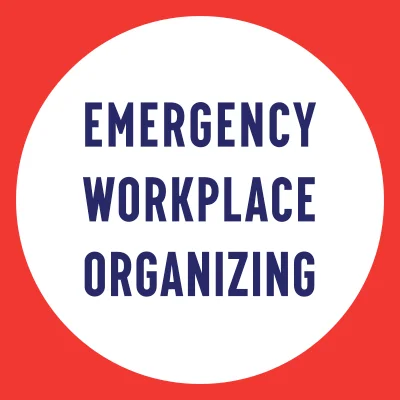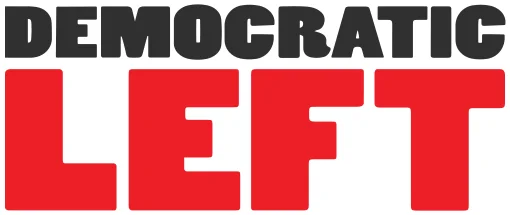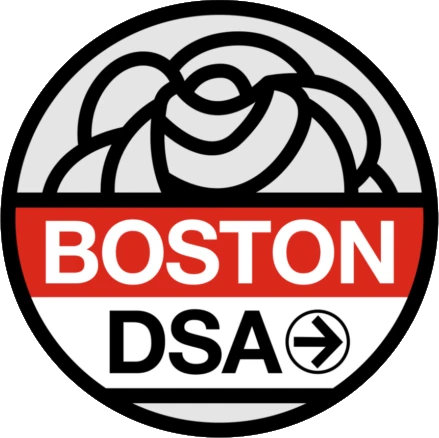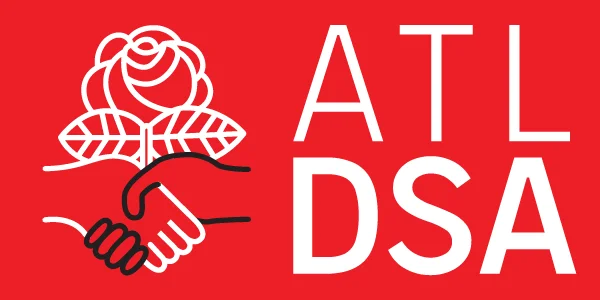
DSA Feed
This is a feed aggregator that collects news and updates from DSA chapters, national working groups and committees, and our publications all in one convenient place. Updated every day at 8AM, 12PM, 4PM, and 8AM UTC.


How to debunk anti-immigrant myths at work
Trump relies on anti-immigrant rhetoric to score points with its base, leaving workers to defend each other on the job. Here are proven ways to do it.
The post How to debunk anti-immigrant myths at work appeared first on EWOC.


“Flock Out of Flag”
Flagstaff DSA’s successful campaign against the surveillance contract shows that organizing can push back against rising repression.
The post “Flock Out of Flag” appeared first on Democratic Left.


Losing Your Whole World To Win a World – A Review of Defiance by Loubna Mrie

[[{“value”:”

By: Travis Wayne
Loubna Mrie was marching up the hill in a sweeping blizzard in Vermont the first time I met her. Mrie’s first words: “I have bagels.” She handed us a large box of bagels she carried as an offering from a famous New York shop to our student organizing committee.
Mrie, then at New York University, had crossed state lines to be a guest speaker and workshop facilitator in the symposium we organized to connect students and domestic movement activists with Syrian revolutionaries in shared talks and workshops on organizing tactics. It was 2017.
In the pages of Defiance, bearing bagels becomes more symbolic: characteristic of a change in the definition of home that seems to represent a change for Mrie, who cracks jokes about “New Yorkers’ pride in bagels and their ignorance of what is happening on our side of the world” when she first arrives in the city. After surviving one soul-crushing loss after another in service of the Syrian cause, where the big tent popular movement led by civil society leaders and godfathered by long-term socialist thinkers like Yassin al-Haj Saleh was rapidly engulfed, ravaged, and co-opted in a liquid imperialist struggle between five colonial powers, Mrie realizes the extent of her loss with the acceptance of a new future:
“It is time for me to let go of Syria and consider New York my new home. This realization gradually helps me settle. I first notice that my mindset has changed when someone asks for my phone number, and I realize that I have it memorized. When people stop me for directions on the subway platform, I no longer avoid them and keep walking like I used to; now, I can give them an answer without a map.”
Loubna Mrie’s story is testament to one Syrian experience of revolution and exile, but its themes resonate on levels far deeper than the story of any given political struggle. Mrie’s memoir is a fiercely personal testimony of the human experience of surviving struggle itself. Despite far more hellish material conditions, organizers today can see in Mrie’s experiences ghosts of our own: displacements, resolutions, family losses, revolutionary relationships, political factions, half-homes seized from under you, political opponents with far more power, manipulators and opportunists, coping with the aftermaths of campaigns – and death. Over time, lots of death.
After describing the unique placement of the Alawite minority in the Assads’ governing political base, positioning her own lived experience within the social and political context of Syria on the eve of revolution, Loubna Mrie’s story ramps up in the household of a tyrant who lords over her household almost as much as Hafez al-Assad. “When we did everything right, we always seemed to have done something wrong” as Loubna and her mother chewed quieter and dodged phones flying just to keep the peace in the home. Abuse becomes clearer than the sun.
The shadow of Loubna’s father stalks the pages of the story far beyond the first ones. “My father’s ability to end lives was what had lifted him and his brothers out of poverty,” from an experience of the colonized working class of midcentury Syria to believing that “poor people are just jealous of us.” Following her family is to follow the story of the consolidation of a particular political rule in Syria. Mrie’s father’s violence becomes the commodified labor needed to transport social fortunes, for which her family is paid handsomely with vast estates of national wealth. Her uncle Wahib is just one beneficiary of Hafez’s rule when he becomes the Syrian “king of steel” overseeing hundreds of workers. Women in her family received next to nothing.
Joining an uprising – and thus rejecting her conservative background for the possibility of a new world – entails deep loss for Loubna just shy of twenty. As an Alawite organizer within the strategically big tent multiethnic movement, Mrie sits in rooms filled with smoke and photos of freedom fighters; argues against conservative intellectuals over whether the lower classes were too sectarian to be trusted with democratic rule; laughs with songwriters cutting their hair while recording songs mocking the military; and inspires, and is inspired by, movement journalists who believe that “documenting the government’s brutality … is the first step towards stopping it.” She organizes distros and pools funds for local civic organizing projects and blocks roads so “people at the intersection are forced to look, read, and witness the courage of the few:” observation and participation, bold action to inspire mass action. She hides her face with a scarf at meetings with ululations that shake the air as organizers blanket the mosques (each Friday, imbued with significance) as organizing spaces, public squares too highly policed.
As Mrie’s roles transitions within the movement she dedicates herself to, she goes out of her way to document municipal elections held against all odds, the first time in a generation for people to experience direct shaping of any aspect of their lives in what Syrian Communist Party (Political Bureau) leader Riad al-Turk called the Kingdom of Silence:
“The next day, Mezar and I join Monzer to film the election of the city council. Despite the constant air strikes, a few dozen people are gathered in a warehouse. They’ve bundled up against the cold and drawn their scarves tight over their heads. The air inside smells of fresh paint and exhaust from the diesel heaters burning in each corner. The windows are sweating, and the revolutionary flag is nailed to the wall behind the four candidates for office.”
Loubna eyewitnesses the noble spirit undergirding so much revolutionary activity. As she notices Kurdish migrant worker shoe shiners amidst the Syrian working class not visible within segregated urban enclaves, the mass action all around her against brutal repression inspires her to imagine new creativities to contribute to the new world:
“A popular chant around this time is for a city called Amuda, an iconic village in the Kurdish areas, but a town so isolated that most people have to spend some time searching for it on a map when they first hear the chant. Its protesters are famous for their signs that carry quotes and poems from the Spanish Civil War…
I want to go. I could shoot a short documentary, I think, showing how a small Kurdish town is teaching us, through their signs, about world history and the revolutions and poets of generations past.”
Like any organizer, critiques of her own movement sprout in Mrie’s mind with each successive month, year, campaign, lived moment. The Free Syrian Army (FSA) became so dependent on funders, Mrie notes, that they turned a blind eye on Turkish involvement in the kidnapping of their own founding leader – a complete loss of the soul of the militias, an early sign of their oblivion. She lambasts those that call for imperialist intervention out of desperation. Even though Gulf country funders “just want a Sunni government to replace the Alawite one,” the most cynical movement leaders trade everything for money. The Syrian National Council is an establishmentarian “hotel opposition,” ripped for “friending us on Facebook just so we can mock them,” while the exiled reduced to the status of Syrian refugee in the eyes of Europe are asked how “‘the revolution in Berlin’ is going.”
The nations expecting Syrian gratitude for basics are not spared Loubna’s wrath: “the Lebanon experienced by rich Syrians is not the same as the one experienced by the poor.”
Loubna also sees the personal horrors, how tragedy can destroy individuals in movement:
“It would take me years to understand that, under pressure, under the fear of death by execution, by torture, by bombing, people can release the monster they’ve spent most of their lives repressing. I didn’t know then that almost every marriage, every friendship that I saw blooming around us in Damascus during this time would die. The two couples that went to jail together and married right after they were released. The girl who was so scared her partner would be taken away by the police that she got pregnant just to preserve something of his smell. Or the girl whose boyfriend’s family rejected her because she was not Sunni, and who agreed to elope with him because the whole country was revolting against injustice, so why couldn’t they? Even Samar and her partner’s relationship would eventually collapse under the strain of exile and the guilt Amer was talking about. So many love stories. All of them decimated, just like our hopes of what Syria would become.”
Loubna copes with the loss of so many: so many lost friends, but also lost lovers – most brutally, Peter Kassig, a U.S. medical worker abducted by ISIS and executed by the fascists. Her partner’s murder isn’t the only one that carves a void into her life. Even movements can’t shelter us from the grief of survival, especially for someone like Mrie, who lost a whole world for a new one – only to end up lost, far from home, making a new home.
In the end, the killer that stalks the pages of Defiance from its beginning doesn’t just murder her mother who begs her to come home; he murders her dream of what home is, till she makes it anew. But the shadow in her family is not just her own, we learn, as one of many final horrors drop in the life of the organizer. When Mrie reveals rumors of Ba’ath Party founder and early leader Salah al-Din al-Bitar’s assassination, we see just how far the shadow could extend.
Defiance stands out because of its imagery: the kunafeh sizzling on copper plates, the wistful lanes of cities, its diligent documenting of the horrific spiraling of the Syrian Revolution beyond the control of any individual. But Defiance also stands out for its insights and foresights, where comrades who end up shot in the head warn of black flags replacing the green of the revolution and of a different kind of regime to come out of the black nihilism the movement descends into: a warning that foreshadows the massacres of Druze and of Alawites at the hands of post-Assad government actors and militias given implicit license to kill, as well as the assault on the socialist feminist autonomous zone of Rojava, which has (for now) averted all-out war in its stand-off with the consolidating state.
Read Defiance to dream, to cry, to feel – and to witness, through her own words, the experience of a fellow comrade who lost a whole world to win a world. Most of all: read Defiance, to survive and to fight, in spite of it all.
Defiance: A Memoir of Awakening, Rebellion, and Survival in Syria is scheduled to be published by Penguin Random House on February 24, 2026.
Travis Wayne is the managing editor of Working Mass.
The post Losing Your Whole World To Win a World – A Review of Defiance by Loubna Mrie appeared first on Working Mass.
“}]]


Mobilization Against Brutality in Minneapolis
Chapter and Verse: Chapter News for December 2025 and January 2026
The post Mobilization Against Brutality in Minneapolis appeared first on Democratic Left.


Statement on the DHS Murder of Alex Pretti
Atlanta DSA vehemently condemns the abhorrent execution of Alex Pretti by a Border Patrol agent on January 24, 2026. Multiple DHS agents fired on Alex as he was attempting to help assist a community member assaulted by a federal agent moments prior. Further, an agent appeared to have removed Alex’s pistol that he was legally permitted to carry before he was executed in cold blood. Plain and simple, this is an attack on the 1st and 2nd Amendment rights every citizen is entitled to in the United States. The federal government then continued its vile tradition of publishing slanderous lies about those it murders in fabricating false narratives about the peaceful, non-violent behaviors of Alex. To us, it is clear that the purpose of a system is what it does and, so, the purpose of DHS (and specifically ICE) is death and violence. Videos and photos over the past century of black, brown, and tan bodies being butchered by human instruments of the law were ignored, minimized, and treated as inconsequential. Now, we live in the darkening shadow cast by the willing and conscious decision of hundreds of Democrat politicians from Washington to Peachtree Street to further increase funding to cops, ICE, and border patrol. Barely one year into the second Trump presidency, the full weight of the American imperial machine has turned inward to crush any act of resistance, no matter how small.
Just this past week, Democrat leaders have continued their decades-long complicity in the manufacturing of divisions between working people through measly gestures at reform of ICE. These ineffective measures follow in the wake of the killing of Renee Nicole Good not even a month ago, to say nothing of the numerous other deaths on the streets and even more in detention centers over the past year. Yet we know, as workers organizing in our workplaces and communities, this fascist regime is composed of incompetent losers that need you to feel small and isolated to succeed. Together, as an organized multi-racial working class, we can build a new, better world as the old neoliberal world order shakes itself to pieces under the weight of its own contradictions. Beyond polls or optics, it is clear that for working people our only position can be that of calling for the complete abolishment of ICE. It continues to serve as the foot soldier force of a burgeoning fascist regime determined to foment further class divisions based on racist, imperialist border policies.
Atlanta DSA once again calls for the abolishment of ICE and the removal of all DHS agents from our communities, as well as the full prosecution of all those involved in acts violating basic human rights under international laws.
We stand in solidarity with those participating across the country in the general strike taking place today. We strongly encourage our members, fellow comrades and union allies, elected politicians, and neighbors to organize with us in the face of this disgusting atrocity.
- If you can, donate to the efforts of Twin Cities DSA to fight ICE and build a better world. You can do so here: https://twincitiesdsa.org/donate/
- Honor the life and memory of Alex Pretti with us at a vigil hosted by National Nurses United, the American Federation of Government Employees, and other community orgs on Thursday, February 5th at 1670 Clairemont Rd in Decatur (the Atlanta VA Medical Center) from 6:30pm-7:30pm.
- Join DSA to support and lead our organizing efforts against ICE and this fascist federal administration: https://atldsa.org/join/


Shipyard Unionism: A Novel of Triumphs and Defeats – a Review of Goliath at Sunset by Jonathan Brandow

[[{“value”:”

By: Kurt Stand
This was originally published by Portside on December 18, 2025.
“Here’s what’s wrong in this yard. Two white welders get fired and blackmailed into silence for their jobs. A third one, black, with an unblemished record, is fired for the same supposed offense and the company refuses to budge.”
“Ain’t right!” someone called.
“But not one of the three welders should have lost a minute of pay, much less their jobs. And why? Because you can’t breathe carbon monoxide! They are all victims of this company’s core value: Production over safety!”
Set at a shipyard in Quincy, Massachusetts where Brandow worked for 9 years, he uses his experiences as a welder and a union officer to give Goliath an authenticity that is too often lacking in fictional depictions of labor. This is evident in his awareness of the complexity of the characters in the novel, in the picture he presents of union meetings, grievance handling, rank-and-file organizing.
Set in the late 70s — early 80s. at the time of the Iran hostage crisis and the racist violence that followed attempts to desegregate Boston’s public school, Brandow places his work in a wider context of events shaping the time without ever losing his focus on the shipyard. The novel centers on the life of Michael Shea, a Vietnam vet whose personal experiences lead to awareness of class injustice (fueled in part by his mother’s picket line assault that results in her death), and, unusual in the community in which he was raised, awareness of racial injustice and a rejection of the racial hatreds that surround him. Shea’s status as a veteran at a time when jobs were plentiful, enables him to find work as a welder. The hazards of shipyard work, the union’s unwillingness to fight back, lead him to become an engaged unionist and eventually, a shop steward. This is shown against the backdrop of personal challenges and difficulties that make this path anything but a linear march of progress.
At the center of the novel is a conflict over the role of shop stewards. Do they serve the union leadership, doling out favors to the skilled, the “loyal,” those who are white; do they defend workers by compromising their rights; or do they fight management through unity, creativity, militancy, by organizing rank and file participation – and reaching out for support outside the workplace.
Behind those choices lies a difference as to how to relate to a changing workforce. A shipyard that in living memory had been almost all white men now includes Black Americans, West Indians, Cape Verdeans, Puerto Ricans, a small but growing number of women, all of whom the old leadership fears and resents. And many of the younger white workers don’t have the commitment to the job or union that older ones had. Thus a weakened union, a union that has become parochial, a union that still tries to represent the workforce but does so through compromises with management that allows for small victories at the expense of loss of rights. The price of doing so is at a cost that will come due.
The battle over the quality of the work stewards perform is merged with the battle to have enough stewards. That conflict is central to all that follows as Brandow makes clear early on.
[Shea] checked his contract … it permitted one steward for each two hundred hardhats in a department. Despite that, the union by-laws capped the number at a single steward [per department]. He couldn’t let that go. How could it be possible that the union – not the company – limited the number of stewards, the front-line protections guys had on the job? Shea realized it really was a black and white issue. The only truly affected department, the only one that qualified under the contract for additional stewards, was welding—the only department with a significant number of black votes.
That sparks a union meeting where the rank-and-file gets defeated by leadership afraid that opening doors might loosen their own authority. Subsequent battles – over racist graffiti in bathrooms, the lay-off of a pregnant worker, speed-up, safety & health concerns, company disciplinary policies, the conduct of a strike – show the shifting sentiment of workers, how prejudiced attitudes can be broken down and how they can resurface. In all of this, the fights and arguments that take place within the union are always presented in the context of the real problem, management policy that devalues the life of all workers.
Brandow’s description of how a rank-and-file movement organizes demonstrates that understanding, its goal is to strengthen the union as a whole, not to attack or undermine it. Here too, his writing reflects what he lived, the meetings, arguments, tensions, celebrations, camaraderie, disappointments, harsh language flung back and forth even between friends, all contain the ring of truth.
Those complications are also those of the characters who people the novel, all with lives outside the job, all facing the pressures of working-class life in which opportunities are few and (even in a more “stable” era) precarious. The violence in the air post-Vietnam, when reaction was raising its ugly head trying to push down progress toward social justice, the uncertainties as those changes were reflected in personal relationships, are very much part of novel’s depiction of workplace life. The multi-racial character of the shipyard and of Boston and its environs as much a part of the story as the reaction to it, just as is the assertiveness of women pushing back against silences that had prevailed.
That reflects itself in the character of the “sell-out” union president, who remembers with nostalgia, the militancy, the willingness to fight, that built the union. He respects the new militancy of Shea and the others pushing for change, as much as he does all in his power to undermine them. He rationalizes the compromises with management he makes every day, for all he sees is a losing battle. His weakness is part of the problem, no doubt, but nonetheless, he is right – management holds the cards. For those who lived through those times, reading Goliath is a reminder of what happened when layoffs swept industry, fear of job loss leading those who had resisted to accept the unacceptable as safety regulations went out the window. The end result is a feeling Brandow well describes as he records Shea’s thoughts toward the end of the novel as the combination of permanent layoffs, unrelenting speed-up, breakdown of shifts and jobs assignments, leave workers demoralized, the old union leadership out in the cold, younger union activists with a sense of defeat.
He knew they thought of their homes, fishing trips in New Hampshire, mythic fiberglass boats skimming over the water, the week, maybe two in a year that they prized as their own. They thought of their own little girls and their sons in their yards. All gone. They knew they would go to their graves with a rage they could never concede. They stood by the basin and yearned for a bright, free beginning. For a start they knew they would never be given.
That describes a reality that those newer to labor activism also need to know for no gain should ever be taken for granted, unity needs to be fought for again and again, struggles for justice at the workplace need to be joined to those taking place in the communities where people live and the broader forces pushing society in one direction or another have to be engaged. Perhaps the greatest strength of the novel lies in making clear that what matters is not just the outcome of a particular battle – for win or lose, it is transitory. Rather what matters is what we take away from each dispute, each organizing effort, how to integrate that in one’s own life. Shea reflects that challenge in himself, his personal weaknesses as much a part of the story as his strengths. The novel’s conclusion providing a good starting point for thinking about how to accept loss, which way to look for new beginnings, a search that – almost by definition, is never easy.
Cotty and Lonny [two of the rank-and-file leaders] watched them go. They looked around, searching for Shea before they went in. He was the last to join the line. Cotty said, “You did what you could.” Shea nodded without hearing. “For real, man,” Lonny added, poking Shea in the chest. “I mean, we had men and women, black and white, every shift pulling together. That’s real. That’s something they can’t take from us.”
“Yeah, maybe,” he said as he followed them into the ship and headed for his worksite. Shea’s legs ached to skip down the stairs, to churn past the gates, to breathe in the freedom outside. Instead, he stumbled his way past slaggy mounds of main deck debris toward his gear. The last whistle blew.
Goliath at Sunset was published by Hard Ball Press on December 15, 2025.
Kurt Stand was active in the labor movement for over 20 years including as the elected North American Regional Secretary of the International Union of Food and Allied Workers until 1997. He is a member of the Prince George’s County Branch of Metro DC DSA, and periodically writes for the Washington Socialist, Socialist Forum, and other left publications. He serves as a Portside Labor Moderator, and is active within the reentry community of formerly incarcerated people. Kurt Stand lives in Greenbelt, MD.
The post Shipyard Unionism: A Novel of Triumphs and Defeats – a Review of Goliath at Sunset by Jonathan Brandow appeared first on Working Mass.
“}]]


Response Letter from the Italian Internationalists
A response to our article on Lotta Communista in Italy.
The post Response Letter from the Italian Internationalists appeared first on Democratic Left.


The myth of “Unions can’t change anything”
What can a stoplight in Syracuse teach us about collective action at work?
The post The myth of “Unions can’t change anything” appeared first on EWOC.


Frigid But Not Frozen
Scenes of repression and resistance in Minneapolis.
The post Frigid But Not Frozen appeared first on Democratic Left.


The World Turns Upside Down
The U.S. behaves as if it will always be on top of the world. Its leaders once knew that nothing lasts forever.
The post The World Turns Upside Down appeared first on Democratic Left.